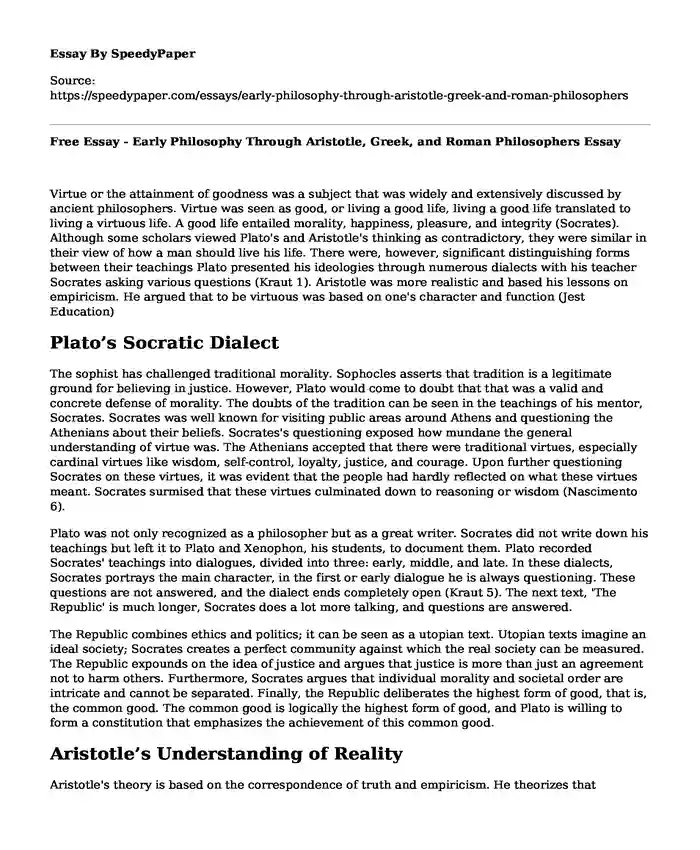
| Type of paper: | Essay |
| Categories: | Philosophers Plato Ancient Greece |
| Pages: | 3 |
| Wordcount: | 744 words |
Virtue or the attainment of goodness was a subject that was widely and extensively discussed by ancient philosophers. Virtue was seen as good, or living a good life, living a good life translated to living a virtuous life. A good life entailed morality, happiness, pleasure, and integrity (Socrates). Although some scholars viewed Plato's and Aristotle's thinking as contradictory, they were similar in their view of how a man should live his life. There were, however, significant distinguishing forms between their teachings Plato presented his ideologies through numerous dialects with his teacher Socrates asking various questions (Kraut 1). Aristotle was more realistic and based his lessons on empiricism. He argued that to be virtuous was based on one's character and function (Jest Education)
Plato’s Socratic Dialect
The sophist has challenged traditional morality. Sophocles asserts that tradition is a legitimate ground for believing in justice. However, Plato would come to doubt that that was a valid and concrete defense of morality. The doubts of the tradition can be seen in the teachings of his mentor, Socrates. Socrates was well known for visiting public areas around Athens and questioning the Athenians about their beliefs. Socrates's questioning exposed how mundane the general understanding of virtue was. The Athenians accepted that there were traditional virtues, especially cardinal virtues like wisdom, self-control, loyalty, justice, and courage. Upon further questioning Socrates on these virtues, it was evident that the people had hardly reflected on what these virtues meant. Socrates surmised that these virtues culminated down to reasoning or wisdom (Nascimento 6).
Plato was not only recognized as a philosopher but as a great writer. Socrates did not write down his teachings but left it to Plato and Xenophon, his students, to document them. Plato recorded Socrates' teachings into dialogues, divided into three: early, middle, and late. In these dialects, Socrates portrays the main character, in the first or early dialogue he is always questioning. These questions are not answered, and the dialect ends completely open (Kraut 5). The next text, 'The Republic' is much longer, Socrates does a lot more talking, and questions are answered.
The Republic combines ethics and politics; it can be seen as a utopian text. Utopian texts imagine an ideal society; Socrates creates a perfect community against which the real society can be measured. The Republic expounds on the idea of justice and argues that justice is more than just an agreement not to harm others. Furthermore, Socrates argues that individual morality and societal order are intricate and cannot be separated. Finally, the Republic deliberates the highest form of good, that is, the common good. The common good is logically the highest form of good, and Plato is willing to form a constitution that emphasizes the achievement of this common good.
Aristotle’s Understanding of Reality
Aristotle's theory is based on the correspondence of truth and empiricism. He theorizes that knowledge requires communication between the image and our idea of it. If the correspondence of our concept and the object does not match, then all we have is an opinion. Unlike Plato's theory of rationalism, Aristotle relied on perception and our innate ability to observe the physical world. This kind of knowledge was termed a posteriori, which comes from understanding via experience. The culmination of different people’s similar observations was the best way to obtain knowledge (Jest Education).
Aristotle further theorized that everything has a purpose or in Greek ‘Telos’. Teleology thus examines the world through the goals and objectives of everything within it. The ability of something or someone to achieve their intended purpose would be the measure of how good they are. Through observation, Aristotle understood that every observed thing had its use, and through induction hypothesized, that everything has a purpose. According to Aristotle, everything has an end, and that end is what justifies the essence of the thing and its virtue.
Works Cited
Jest Education. “6. Aristotle’s Understanding of Reality.” YouTube, 3 Apr. 2020, www.youtube.com/watch?v=OrQ442KEokkKraut, Richard. “Plato (Stanford Encyclopedia of Philosophy).” Stanford.Edu, 2017, plato.stanford.edu/entries/plato/
Nascimento, Daniel Simão. "Socrates, Vlastos, Scanlon, and the Principle of the Sovereignty of Virtue." Revista Archai, no. 30, May 2020, p. e03009, doi:10.14195/1984-249x_30_9.Socrates. “The Pursuit Of Virtue: Plato’s ‘The Meno.’” Classical Wisdom Weekly, 25 May 2014, classicalwisdom.com/philosophy/socrates-plato/pursuit-virtue-platos-meno/#:~:text=Socrates%20proposes%20that%20virtue%20is,can%20sometimes%20bring%20us%20harm
Cite this page
Free Essay - Early Philosophy Through Aristotle, Greek, and Roman Philosophers. (2023, Oct 15). Retrieved from https://speedypaper.com/essays/early-philosophy-through-aristotle-greek-and-roman-philosophers
Request Removal
If you are the original author of this essay and no longer wish to have it published on the SpeedyPaper website, please click below to request its removal:
- Comparison Essay Sample on Virtue Views by Confucius and Aristotle
- Lao Tzu - Free Essay about Chinese Philosopher
- Industrial Revolution and the Era of Nationalism and Imperialism
- Essay Sample on Art Midterm
- Essay Sample on Maus: Readings and Discussion
- Free Paper Sample on History of Western Civilization II
- Plato's Philosophical Themes: Exploring Rhetoric, Virtue, and Power - Free Report Sample
Popular categories




